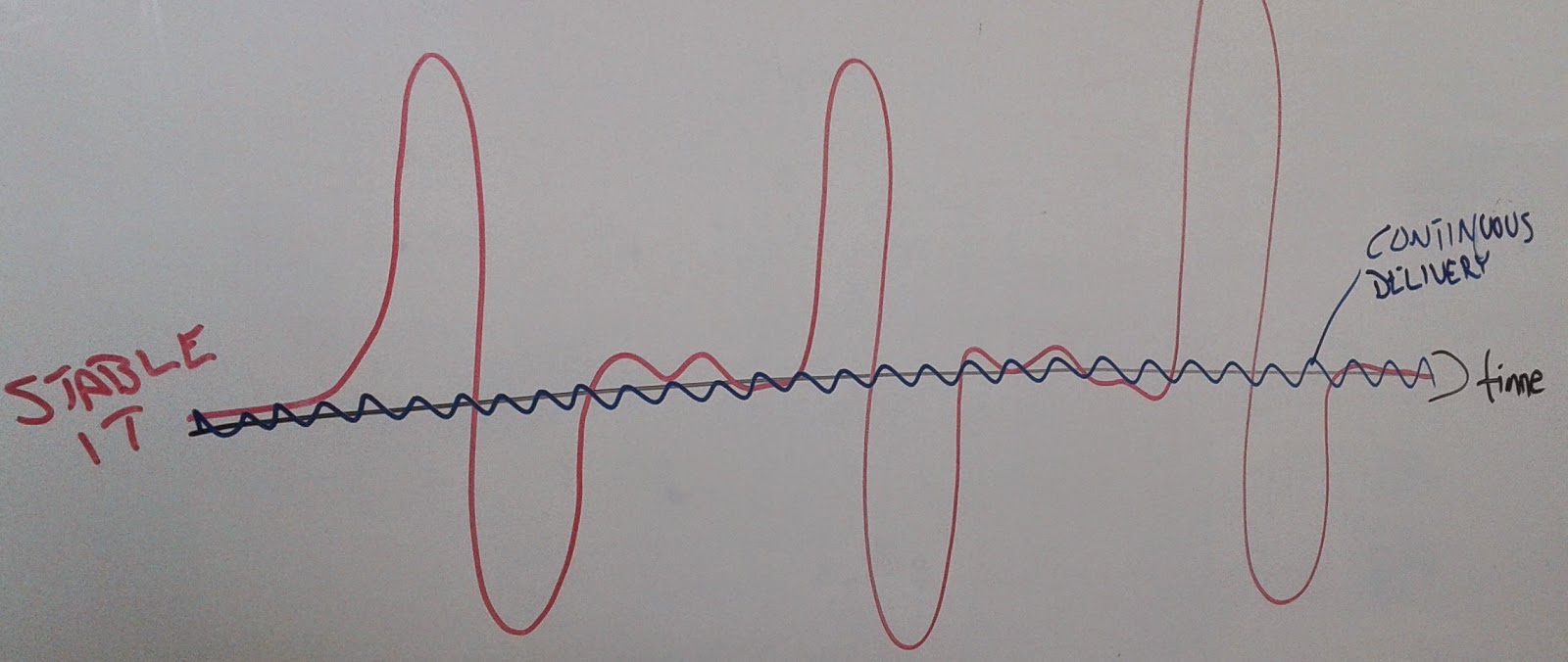Have you noticed that people and organisations that are great have a lot of luck? And the opposite is also true: a poorly managed companies are unluckier. In my experience.
Now, I don’t think luck has anything to do with it (no - this is not a post about my Christian faith, please contact me for that :)). Which is good news; because that means that we can control it, do something about it.
I’ll share a few stories and then some thoughts in this post.
Example 1 - Clarinet players
I had the good fortune to do my military service in the Royal Swedish Army Band (1992 version) and playing there had a great influence on my musical life. I also got to meet some amazing musicians and some of them went on to great heights.

Nothing to do with Kristian
I’m a brass musician (euphonium, mind you) and I had little experience with wood winds, whats easy and hard on those instruments, before being in the Royal Swedish Army Band. Specifically the technical fluency of the clarinet impressed me, and the high-pitched squeekes (pull a chair out and you know what I mean) that sometime came out of the clarinets, had me confused. Even great players produced these from time to time.
I noticed that our best player, Kristian Möller (who went on to amazing things), never had those sounds coming from his instrument. So I asked him:
Me: Can’t you teach the others to stop doing SQUUEEEEEK? Kristian: No. You can’t control that. It has to do with moist and … well it’s just bad luck. Me: But… it never happens to you Kristian (with a sly smile): Well, I guess I’m lucky then.
No, he wasn’t. He was an awesome player. He practiced since forever. And kept practicing. That gave him margins. Luck had nothing to do with it.
Example 2 - Company X
I have been working with an organisation lately that was missing a vital permit. They were super late with their application. They official authorities promised to handle things as fast as possible, since they really needed that permit.
Without the permit they were subjected to big risks.
They pushed hard, got the application in just in time, started to wait…. and got unlucky.
The person handling the permit was hit by a car and hospitalised. They had to wait a few weeks more. They were really unlucky.
No… they really were not unlucky. They cut every corner they could think of. They ran too fast and started too late. They worked too much in a short while. That gave them small margins. Luck had nothing to do with it.
Example 3 - Goal keepers

Sweden have a long tradition of awesome hockey goal keepers. One of the truly great ones was Pekka Lindmark. He famously said (if I remember correctly it right):
The goal posts are my best friends
and
A good goal keeper have a lot of luck.
No… good goal keepers are not luckier. They train a lot. They have done that since forever. And they keep training. That gives them margins. Luck has nothing to do with it.
Example 4 - Deployments
I’ve worked a lot in the insurance industry. They manage risks for a living - that’s how they make their money.
At one such company the IT department had declared the “Stable IT”-year. They were reducing their 4 releases a year to 2. Just to make sure that the IT ran stable and nice.
What happened at those deployment periods, do you think?
- Before them everyone was trying to get all the things they needed ready. Corners was cut
- During the deployment about 300 systems was deployed and changed at once.
- The complexity of the deployment projects was enormous.
- They had 4 full-time employed Deployment project managers, just to coordinate the activities
- If they were really lucky everything went just as planned.
- Often (who said “Always”?!) things went bad. For at least some of the dependencies. Unluck and unexpected things.
- Minor extra releases had to be made. After the main release. Changing things even further.
At this time I gave a Lean presentation and I had a slide on continuous delivery in there. This made them angry. I tried to show them with a drawing like follows:

To my surprise they said: well, your blue line is never stable. And if we just plan a little bit more … next time will be without errors. (“And if you’re lucky” … I thought to myself)
No… it will not. Because you will not be lucky. It’s too complex to do at the same time. Unexpected things will happen and with this complexity it will be impossible to handle. Luck has nothing to do with it.
How to get luckier
Well, you can’t. Or at least you should not have that as a strategy. Things happen that we didn’t expect all the time. Some of them goes our way, some of them goes against our expectation.
To me we now have two choices:
#noUnexpected- Plan for every possible outcome so that we quite sure that we’re never surprised#changeIsTheNewStable- Adjust your process and ways of working so that you can change when unexpected things happen
If you’ve read anything of what I’ve written you know that I lean strongly against 2. I think 1 above will be impossible, to expensive and very slow. There’s a great talk by Dan North on the topic of unexpected events that I recommend.
With 2 alternatives we’re taking the ever changing nature of reality into consideration and instead prepare to change (yes… I said it again… change) our process, policies and ways of working.
Now, this is not just something that we can say “Now” and start to do. Or well it is… but this will cost. We you want to do this you now have to do the work to implement the change. Rewrite the “Standard Operating Procedure”, roll out new training programs.
And here’s the bad news; you will have to do this often. In fact, you will have to have ways to get feedback faster, and to change faster in order for this to be an improvement tool. (Notice how cleverly I avoided to say how fast to get feedback and do changes. I only said faster. Ever faster). The smaller changes you do the faster you can do them.
So maybe, writing “Standard operating procedures” is not the way to go. Or we should write them differently. Or let the people who work with the current situation change themselves. Maybe we shouldn’t train as we do today…
Maybe we have to change the way we change too.
Conclusion
Luck has nothing to do with it, unexpected things will happen. You can control how you will act when those things happen. And how fast you will act. Change (often) is the new stable.